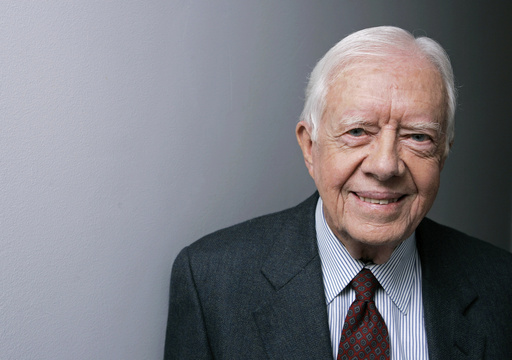
Jimmy Carter, the former U.S. president who redefined the post-presidency, passed away on Sunday at 100 years old. His son, Chip Carter, confirmed that he died peacefully at home in Plains, Georgia, around 3:45 p.m.
Early Life and Education
James Earl Carter Jr. was born in Plains on Oct. 1, 1924, the first of four children of Earl Carter, a farmer and businessman, and Lillian Gordy Carter, a registered nurse.
He gained an appointment to the U.S. Naval Academy, graduated, and joined the Navy submarine branch where, in seven years. He worked his way into “Rickover’s boys,” the elite nascent unit of America’s nuclear submarine fleet championed by the iconic Admiral Hyman Rickover. Carter was on his way up until a death at home changed his destiny.
Return to Plains and Political Beginnings
His father Earl, a farmer, businessman, and cornerstone personality in the Plains community, died from cancer. Carter left the Navy and its far-from-Plains postings such as Hawaii, and he, Rosalynn, and their growing family returned to Georgia in 1953 to take over the family farming business. It was there he first ran for school board, then state senator.
Governorship and Presidential Campaign
He was elected governor in 1970. Carter served one successful term before launching an improbable bid to become president, winning the Democratic nomination and then defeating Republican President Gerald Ford in November 1976.
On his inauguration day, rather than driving past the crowds in an armored limousine. Jimmy and Rosalynn emerged from the car with daughter Amy at their side and walked down Pennsylvania Avenue, holding hands and waving.
Achievements and Challenges as President
Carter’s successes included promoting human rights, adding to the national park and preserve system, reestablishing governmental credibility after the Watergate Crisis. The Camp David Accords forged a peace agreement between Egypt and Israel. They were overshadowed by trouble at home and abroad. At home, Carter and his advisers, most of them Washington outsiders, met resistance from his own party.
Then, in November 1979, Iranian militants stormed the U.S. Embassy in Tehran and took hostages. He tried negotiation, then launched a bold rescue mission that never reached its target because of helicopter failure. He could not resolve the situation until the last day of his administration.
At home, a foundering economy exacerbated by oil embargoes from Mideast countries and the rise of the Republican Party under Ronald Reagan helped lead to his defeat in November 1980.
Post-Presidency and Humanitarian Legacy
Carter returned to tiny Plains and used the power of an ex-president’s bully pulpit as the springboard to his last, and, some say, his best act.
Carter began volunteering for Habitat for Humanity, a fairly new Americus-based organization, building houses for the poor. Then, together with Rosalynn, he founded the Atlanta-based Carter Center. Carter focused on making peace and spreading health and democracy around the world. It will carry the couple’s humanitarian and democratic work forward.
Awards and Global Recognition
From his work as president and as the leader of the Carter Center, he won the Nobel Prize, the United Nations Human Rights Prize. Also many other notable awards from countries, organizations, and world leaders. The Carters both were awarded the Presidential Medal of Freedom by President Bill Clinton.
”Jimmy and Rosalynn Carter,” Clinton said, “have done more good things for more people in more places than any other couple on the face of the Earth.”
A Life Well Lived
Rosalynn Carter, Jimmy Carter’s wife of 77 years, died in November 2023.
They are survived by their children Amy, Chip, Jack, and Jeff; 11 grandchildren; and 14 great-grandchildren.
An Enduring Legacy
Historians continue to recognize Carter’s enduring legacy. Douglas Brinkley, a history professor at Rice University, highlighted this in his book, “The Unfinished Presidency of Jimmy Carter.” He remarked, “People will be celebrating Jimmy Carter for hundreds of years. His reputation is only going to grow.”
From his humble beginnings in Plains to becoming a global icon of humanitarian efforts, Carter’s life serves as an inspiring example of dedication, compassion, and resilience.